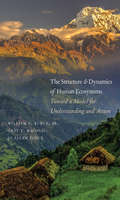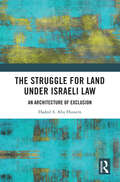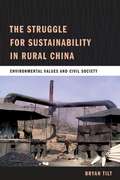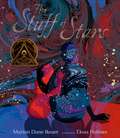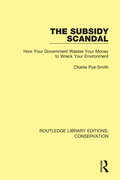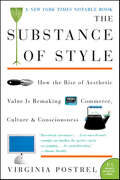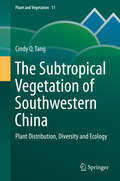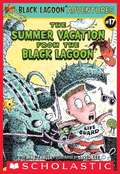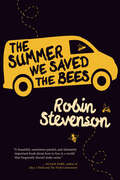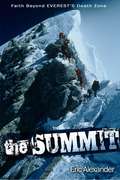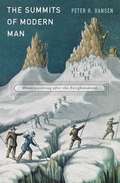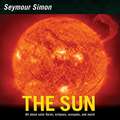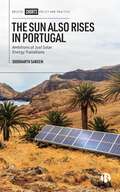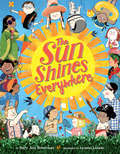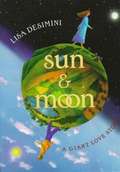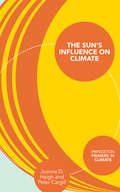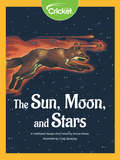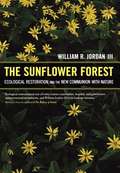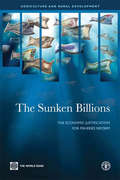- Table View
- List View
The Structure and Dynamics of Human Ecosystems: Toward a Model for Understanding and Action
by William R. Burch Gary E. Machlis Jo Ellen ForceA landmark book that strives to provide both grand theory and practical application, innovatively describing the structure and dynamics of human ecosystems As the world faces ever more complex and demanding environmental and social challenges, the need for interdisciplinary models and practical guidance becomes acute. The Human Ecosystem Model described in this landmark book provides an innovative response. Broad in scope, detailed in method, at once theoretical and applied, this grand study offers an in-depth understanding of human ecosystems and tools for action. The authors draw from Goethe’s Faust, classic anthropology and sociology studies, contemporary ecosystem ecology, Buddhist ethics, and more to create a paradigm-shifting model and a major advance in interdisciplinary ecology.
The Struggle for Land Under Israeli Law: An Architecture of Exclusion
by Hadeel S. Abu HusseinThis book provides a comprehensive examination of land law for Arab Palestinians under Israeli law. Land is one of the core resources of human existence, development and activity. Therefore, it is also a key basis of political power and of social and economic status. Land regimes and planning regulations play a dynamic role in deciding how competing claims over resources will be resolved. According to legal geography, spatial ordering impacts legal regimes; whilst legal rules form social and human space. Through the lenses of international law, colonisation and legal geography, the book examines the land regime in Israel. More specifically, it endeavours to understand the spatial strategies adopted by Israel to organise the entire territorial expanse of the country as Jewish, while also excluding Arab Palestinian citizens of Israel and residents of East Jerusalem from the landscape. The book then details how the systematic nature and processes of marginalisation are mapped out across the civil, political and socio-economic landscape. This monograph will be of interest to international legal theorists, legal geographers, land lawyers and human rights practitioners and students; as well as to international scholars, NGOs and others focusing on the Israeli–Palestinian conflict.
The Struggle for Sustainability in Rural China: Environmental Values and Civil Society
by Bryan TiltThough China's economy is projected to become the world's largest within the next twenty years, industrial pollution threatens both the health of the country's citizens and the natural resources on which their economy depends. Capturing the consequences of this reality, Bryan Tilt conducts an in-depth, ethnographic study of Futian Township, a rural community reeling from pollution. The industrial township is located in the populous southwestern province of Sichuan. Three local factories-a zinc smelter, a coking plant, and a coal-washing plant-produce air and water pollution that far exceeds the standards set by the World Health Organization and China's Ministry of Environmental Protection. Interviewing state and company officials, factory workers, farmers, and scientists, Tilt shows how residents cope with this pollution and how they view its effects on health and economic growth. Striking at the heart of the community's environmental values, he explores the intersection between civil society and environmental policy, weighing the tradeoffs between protection and economic growth. Tilt ultimately finds that the residents are quite concerned about pollution, and he investigates the various strategies they use to fight it. His study unravels the complexity of sustainable development within a rapidly changing nation.
The Stuff of Stars
by Marion Dane Bauer Ekua Holmes<p>In an astonishing unfurling of our universe, Newbery Honor winner Marion Dane Bauer and Caldecott Honor winner Ekua Holmes celebrate the birth of every child. <p>Before the universe was formed, before time and space existed, there was . . . nothing. But then . . . BANG! Stars caught fire and burned so long that they exploded, flinging stardust everywhere. And the ash of those stars turned into planets. Into our Earth. And into us. In a poetic text, Marion Dane Bauer takes readers from the trillionth of a second when our universe was born to the singularities that became each one of us, while vivid illustrations by Ekua Holmes capture the void before the Big Bang and the ensuing life that burst across galaxies. A seamless blend of science and art, this picture book reveals the composition of our world and beyond — and how we are all the stuff of stars.</p>
The Subsidy Scandal: How Your Government Wastes Your Money to Wreck Your Environment (Routledge Library Editions: Conservation #7)
by Charlie Pye-SmithOriginally published in 2002, The Subsidy Scandal examines the subsidies spent by governments and the affect this has had on the environment. The book examines industries ranging from agriculture to mining, energy to transport and the subsidies spent on these industries by government. The book argues that these industries have had a negative impact on the environment, often funded through government subsidies derived from public taxes. The book suggests that these subsidies go to those who least need them – frequently to corporations and special interest groups which recycle some of the funds to support the politicians who keep the subsidies going. Based on research in North America, with examples from Europe and elsewhere, the book provides an investigative report into to the money assigned to environmental policies to find out where the money goes and what produces it.
The Substance of Style: How the Rise of Aesthetic Value Is Remaking Commerce, Culture, and Consciousness
by Virginia PostrelWhether it's sleek leather pants, a shiny new Apple computer, or a designer toaster, we make important decisions as consumers every day based on our sensory experience. Sensory appeals are everywhere, and they are intensifying, radically changing how Americans live and work. The twenty-first century has become the age of aesthetics, and whether we realize it or not, this influence has taken over the marketplace, and much more.In this penetrating, keenly observed book, Virginia Postrel makes the argument that appearance counts, that aesthetic value is real. Drawing from fields as diverse as fashion, real estate, politics, design, and economics, Postrel deftly chronicles our culture's aesthetic imperative and argues persuasively that it is a vital component of a healthy, forward-looking society.Intelligent, incisive, and thought-provoking, The Substance of Style is a groundbreaking portrait of the democratization of taste and a brilliant examination of the way we live now.
The Subtropical Vegetation of Southwestern China
by Cindy Q. TangThis book provides a wealth of high-quality scientific information on the patterns and processes of vegetation change across a broad range of spatial and temporal scales, concentrating on Southwestern China, mostly on the Yunnan region, and extending to the Yangtze River valley near the boundaries separating Chongqing, Sichuan and Guizhou.
The Sultan Demands His Heir
by Maya BlakeShe will become his bride!Newly crowned sultan Zaid Al-Ameen is determined to rid his country of corruption. Unfortunately for Esme Scott, that means arresting her conman father—leaving her with little choice but to strike a deal with his captor.Zaid sees a golden opportunity in social worker Esme: his country needs reform, and it’s her area of expertise. But working together sparks an insatiable longing—and after a heated encounter, they realize she’s pregnant!Zaid’s sensual power over Esme leaves her helpless to resist his demands. She never imagined she’d become wife to a sultan—until Zaid’s expert touch persuades her otherwise…
The Summer My Father Was Ten
by Pat BrissonEvery year my father and I plant a garden. Tomatoes, peppers, onions, marigold, and zinnias grow in neat, straight rows...and every spring my father tells me about Mr. Bellavista and the summer my father was ten. -From the book. That was the summer the boy lost a baseball under a tomato plant in Mr. Bellavista's garden. And someone tossed a tomato back instead of the baseball. A lively battle took place, which seemed like great fun at the time, but in the end Mr. Bellavista's garden had been destroyed. In a touching story of one boy's efforts to make amends, we see the rebuilding of a garden and the forming of a relationship across generations. With luminous, beautifully detailed watercolors, the artist has captured both the sadness and the quiet joy woven throughout the tale.
The Summer Vacation from the Black Lagoon (Black Lagoon Adventures)
by Mike ThalerAfter getting so bundled up that he can hardly move, Hubie tries to enjoy his snow day off from school.
The Summer We Saved the Bees
by Robin StevensonWolf's mother is obsessed with saving the world's honeybees, so it's not too surprising when she announces that she's taking her Save the Bees show on the road--with the whole family. <P><P> Wolf thinks it's a terrible plan, and not just because he'll have to wear a bee costume--in public. He likes his alternative school and hates the idea of missing weeks of classes. His teenage stepsister doesn't want to leave her boyfriend, and one of his little half sisters has stopped talking altogether, but Wolf's mom doesn't seem to notice. She's convinced that the world is doomed unless ordinary people take extraordinary action. <P><P> It isn't until the kids take some drastic action of their own that she is forced to listen when Wolf tells her that dragging the family around the province in a beat-up Ford panel van may not be the best idea she ever had.
The Summit
by Eric AlexanderIt's one of the greatest challenges one can face on Earth: an ascent to the top of the world on the slopes of Mount Everest. Eric Alexander experienced grace and a faith-empowering journey he will never forget as part of a record-setting team in May 2001, scaling the heights of Everest with his friend, blind climber Erik Weihenmayer. Experience some of the most dangerous locations in the world, including abject terror on Ama Dablam, a blind ski descent of Russia's Mount Elbrus, and up Kilimanjaro in Africa with four blind teens Gain wisdom in the application of trust, courage, innovation, teamwork, leadership, and integrity to overcome your own Everests. Discover practical faith lessons learned on the highest peaks of six continents. Here is the powerful story of Eric Alexander and his unique life journey of guiding people with disabilities as they overcome the most perilous places of the world. Follow in their footsteps, and learn about faith, trust, prayer, depending on God, as well as the perseverance needed in your own life. Be inspired and motivated by Eric's insight, not simply to survive but to thrive every day in God's grace.
The Summits of Modern Man
by Peter H. HansenMountaineering has served as a metaphor for civilization triumphant. A fascinating study of the first ascents of the major Alpine peaks and Mt. Everest, The Summits of Modern Man reveals the significance of our encounters with the world’s most forbidding heights and how difficult it is to imagine nature in terms other than conquest and domination.
The Sun (Seymour Simon Science Ser.)
by Seymour SimonIn this completely updated edition of The Sun featuring beautiful full-color photographs, Seymour Simon presents a fascinating introduction to the star that is the center of our Solar System.Young readers will love exploring the wonders of the sun, from the constant nuclear explosions at its core to the sea of boiling gases that forms its surface.Seymour Simon knows how to explain science to kids and make it fun. He was a teacher for more than twenty years, has written more than 250 books, and has won multiple awards.This book includes an author's note, glossary, and index and supports the Common Core Learning Standards, Next Generation Science Standards, and the Science, Technology, Engineering, and Math (STEM) standards.
The Sun Also Rises in Portugal: Ambitions of Just Solar Energy Transitions
by Siddharth SareenAvailable open access digitally under CC-BY-NC-ND licence. Portugal is among the best-placed European countries to take advantage of solar power, having achieved a five-fold increase in installed capacity during 2017-2023 despite financial constraints. In 2023, its National Energy and Climate Plan set an ambitious target for a further eight-fold increase from 2.5 GW to 20.4 GW by 2030. How can such fast-paced deployment secure sociospatial justice? What insights do political economic dynamics hold for future transitions? Drawing on long-term, multi-sited ethnographic fieldwork, this book is a one-stop resource for policy makers, practitioners, scholars, and anyone interested in just solar energy transitions. Siddharth Sareen won the 2024 Nils Klim Prize, recognising his exemplary work in the search for renewable and sustainable sources of energy.
The Sun Over Breda: The Adventures Of Captain Alatriste (The Adventures of Captain Alatriste)
by Arturo Perez-ReverteThe third in the bestselling Captain Alatriste series.Flanders, 1625. After his tussles with the Inquisition and the intrigue of the Spanish court, Captain Alatriste has returned to the mud and desperation of the long war in Flanders. This is Iñigo's first experience of war and the realities of hand to hand combat. It is on the battlefield that he will finally have the chance to become a man and prove his worth.The troops are weary and ill-nourished and the winter has been long. As Spain sinks ever further into depravity and corruption, the soldiers have not been paid and must survive by whatever ways they can. Mutiny is in the air, but the Spaniards are strong and their famous iron discipline has brought them many victories against the Calvinist forces of the heretics. Reputation, honour, and the glory of Spain will keep them in the fight, but for how long? Meanwhile, the Captain's trusted friend Quevedo's star is rising at court and he keeps Alatriste appraised of the machinations of his arch-enemy Luis de Alquézar and the notorious assassin with the black heart, Gualterio Malatesta.
The Sun Over The Mountains: A Story of Hope, Healing and Restoration
by Suzie FletcherA memoir of hope, healing and restoration, from star of TV's The Repair Shop, Suzie Fletcher.Suzie Fletcher is the warm and friendly face on TV's The Repair Shop that viewers look forward to watching every week as the resident leather expert - a craft she has honed over four decades and was born out of her love of horses. But while she tends to be the one repairing and offering a gentle kindness to others, Suzie has also been in a process of change, reflection, and healing.In her first book Suzie looks back over her life - which moves from England to Colorado and back again - and the places, people and experiences that have shaped the person she is today. We'll hear for the first time, how Suzie has overcome some of life's most difficult challenges, from complicated relationships to grief.A self-confessed free spirit with a deep connection to nature, Suzie's exceptional warmth and zest for life shine through on every page, making The Sun Over the Mountains a truly inspiring read that will resonate with anyone who has faced uncertainty but has the courage and power within them to overcome it.Featuring Suzie and her brother Steve in conversation - exclusive to the audiobook!
The Sun Over The Mountains: A Story of Hope, Healing and Restoration
by Suzie FletcherA memoir of hope, healing and restoration, from star of TV's The Repair Shop, Suzie Fletcher.Suzie Fletcher is the warm and friendly face on TV's The Repair Shop that viewers look forward to watching every week as the resident leather expert - a craft she has honed over four decades and was born out of her love of horses. But while she tends to be the one repairing and offering a gentle kindness to others, Suzie has also been in a process of change, reflection, and healing.In her first book Suzie looks back over her life - which moves from England to Colorado and back again - and the places, people and experiences that have shaped the person she is today. We'll hear for the first time, how Suzie has overcome some of life's most difficult challenges, from complicated relationships to grief.A self-confessed free spirit with a deep connection to nature, Suzie's exceptional warmth and zest for life shine through on every page, making The Sun Over the Mountains a truly inspiring read that will resonate with anyone who has faced uncertainty but has the courage and power within them to overcome it.
The Sun Over The Mountains: A Story of Hope, Healing and Restoration
by Suzie FletcherA memoir of hope, healing and restoration, from star of TV's The Repair Shop, Suzie Fletcher.Suzie Fletcher is the warm and friendly face on TV's The Repair Shop that viewers look forward to watching every week as the resident leather expert - a craft she has honed over four decades and was born out of her love of horses. But while she tends to be the one repairing and offering a gentle kindness to others, Suzie has also been in a process of change, reflection, and healing.In her first book Suzie looks back over her life - which moves from England to Colorado and back again - and the places, people and experiences that have shaped the person she is today. We'll hear for the first time, how Suzie has overcome some of life's most difficult challenges, from complicated relationships to grief.A self-confessed free spirit with a deep connection to nature, Suzie's exceptional warmth and zest for life shine through on every page, making The Sun Over the Mountains a truly inspiring read that will resonate with anyone who has faced uncertainty but has the courage and power within them to overcome it.
The Sun Shines Everywhere
by Luciano LozanoA celebration all the different people and cultures under the sun from Mary Ann Hoberman, award-winning and bestselling author of the You Read to Me, I'll Read to You series. Throughout history, from dinosaurs and ancient Rome to today's bustling playgrounds and cafes, one thing binds us all together: the sun! Beloved author Mary Ann Hoberman weaves together timely themes of valuing diversity, building community, and caring for the environment in this rhyming picture book about how the power of sunshine inspires and unites us all around the world. With joyous art from illustrator Luciano Lozano, this perfect rhyming read-aloud reminds us that all life is precious, and all life shares one sun--and the sun shines everywhere!
The Sun and Moon
by Lisa DesiminiTold in simple and moving prose, this is the story of two lonely giants who are destined to find each other. Each feeling isolated for being so tall, the girl giant follows the moon because she is afraid of daylight and the boy giant followed the sun because he is afraid of the dark. When their paths finally meet, the girl and boy fall in love.
The Sun's Influence on Climate
by Peter Cargill Joanna D. HaighThe Earth's climate system depends entirely on the Sun for its energy. Solar radiation warms the atmosphere and is fundamental to atmospheric composition, while the distribution of solar heating across the planet produces global wind patterns and contributes to the formation of clouds, storms, and rainfall. The Sun's Influence on Climate provides an unparalleled introduction to this vitally important relationship.This accessible primer covers the basic properties of the Earth's climate system, the structure and behavior of the Sun, and the absorption of solar radiation in the atmosphere. It explains how solar activity varies and how these variations affect the Earth's environment, from long-term paleoclimate effects to century timescales in the context of human-induced climate change, and from signals of the 11-year sunspot cycle to the impacts of solar emissions on space weather in our planet's upper atmosphere.Written by two of the leading authorities on the subject, The Sun's Influence on Climate is an essential primer for students and nonspecialists alike.
The Sun, Moon, and Stars
by Craig Spearing Donna HenesThe First People had only four lights to illuminate the world. The First People asked First Man and First Woman to give them more daylight. In this traditional Navajo story, learn how First Man and First Woman created the sun, moon, and stars to give light to the First People.
The Sunflower Forest: Ecological Restoration and the New Communion with Nature
by William R. Jordan IIIWilliam R. Jordan III outlines a vision for a restoration-based environmentalism that has emerged from his work over twenty-five years and explores the promise of restoration, both as a way of reversing environmental damage and as a context for negotiating our relationship with nature.
The Sunken Billions: The Economic Justification for Fisheries Reform
by Kieran Kelleher Rolf Willmann Ragnar Arnason'The Sunken Billions: The Economic Justification for Fisheries Reform' shows the difference between the potential and actual net economic benefits from marine fisheries is about $50 billion per year, or some $2 trillion over the last three decades. If fish stocks were rebuilt, the current marine catch could be achieved with approximately half the current global fishing effort. This illustrates the massive overcapacity of the global fleet. The excess competition for the limited fish resources results in declining productivity, economic inefficiency, and depressed fisher incomes. The focus on the deteriorating biological health of world fisheries has tended to obscure their equally critical economic health. Achieving sustainable fisheries presents challenges not only of biology and ecology, but also of managing political and economic processes and replacing pernicious incentives with those that foster improved governance and responsible stewardship. Improved governance of marine fisheries could regain a substantial part of this annual economic loss and contribute to economic growth. Fisheries governance reform is a long-term process requiring political will and consensus vision, built through broad stakeholder dialogue. Reforms will require investment in good governance, including strengthening marine tenure systems and reducing illegal fishing and harmful subsidies. Realizing the potential economic benefits of fisheries means reducing fishing effort and capacity. To offset the associated social adjustment costs, successful reforms should provide for social safety nets and alternative economic opportunities for affected communities.
